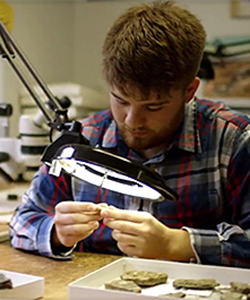Meet Vincent O'Leary

Degree: BS Environmental Science ’18, Minors in Geoscience and Mathematics
Co-ops:
- Geographic Information System Research and Field Research Assistant, Academy of Natural Sciences of Drexel University (ANS)
- Database Designer, ANS
- Paleontology Research Assistant, ANS, and Hollings Scholar Intern, National Centers for Environmental Information (two three-month co-ops)
Awards: NOAA Hollings Scholarship, Udall Scholarship, Truman Scholarship, Drexel STAR (Students Tackling Advanced Research) Scholarship
From monitoring climate change at Pennsylvania’s Lake Lacawac to exploring tribal water rights in Michigan, Environmental Science major Vincent O’Leary has embraced his department’s motto of “Field Experience, Early and Often.”
What research or co-op experiences have you had?
Drexel has allowed me many opportunities as an undergraduate to do research and present my work across the country. I knew I wanted to work in a lab in college, and I found myself at the Academy of Natural Sciences before the end of my first year. I began with fossils, preparing specimens from the Arctic and taking photographs for future work under Dr. Ted Daeschler. I moved between labs a lot early on, working on computer models of species distributions for my STAR Scholars project, and then full-time investigating the biodiversity of Jamaican snails for my first co-op position. I was encouraged to work on a diversity of projects and ask my own questions, which has allowed me to present my work at conferences at Harvard, Stanford and more.
My research has also taken me outside the classroom. I spent weeks in rural Pennsylvania sampling watersheds for contaminations and travelled upstate to monitor climate change at Lake Lacawac. My second co-op was spent working on computer systems and data analysis at the Academy, where I got to bring all my work together and build tools for others to expand on.
Which element of your Drexel experience do you identify most with, and why?
The community-based learning courses and travel-integrated experiences are some of the greatest advantages of my education at Drexel. Before the fall term, I traveled to Michigan with the Honors College to learn about tribal water rights from the Little Traverse Bay Band of Odawa Indians. Drexel offers many short travel courses in between academic terms, which have allowed me to immerse myself in other cultures without the disruption of studying abroad for an entire term. In the fall, I took the Honors Symposium course Community Mobilization and Advocacy, as well as the community-based learning course Prison, Society and You. Both courses are focused on the community around Drexel, and what my role can be to support and promote the people within these communities.
These opportunities broadened my worldview and helped me understand how to be an active participant in my community. I also recently started volunteering at the School of the Future in their science classrooms and after-school programs. Just a few months ago, I would have thought I would be preparing to apply for graduate school, but now I want to wait a few years and spend more time involved in outreach and education before I settle on a graduate program.
What is one thing a faculty member has told you that stuck with you?
Something that helped me to thrive at Drexel was when a faculty member reminded me that I am a student, I am here to learn, and when I fail, I shouldn’t be afraid to ask for help.
What motivates you?
Applying what I learn in class in real-world research every day motivates me to learn more and work harder. Asking questions and working with others to solve problems is the most exciting part of being a student at Drexel. Drexel has incredible support for undergraduates to participate in research as soon as they arrive on campus. The motto here at BEES is “Field Experience, Early and Often,” and I found my home under this call.
APPLY FOR A DEGREE IN THE BIODIVERSITY, EARTH & ENVIRONMENTAL SCIENCE DEPARTMENT
Apply for a degree in environmental science, geoscience or environmental studies and sustainability. Visit campus to get firsthand information about a Drexel education, or contact us at bees@drexel.edu.